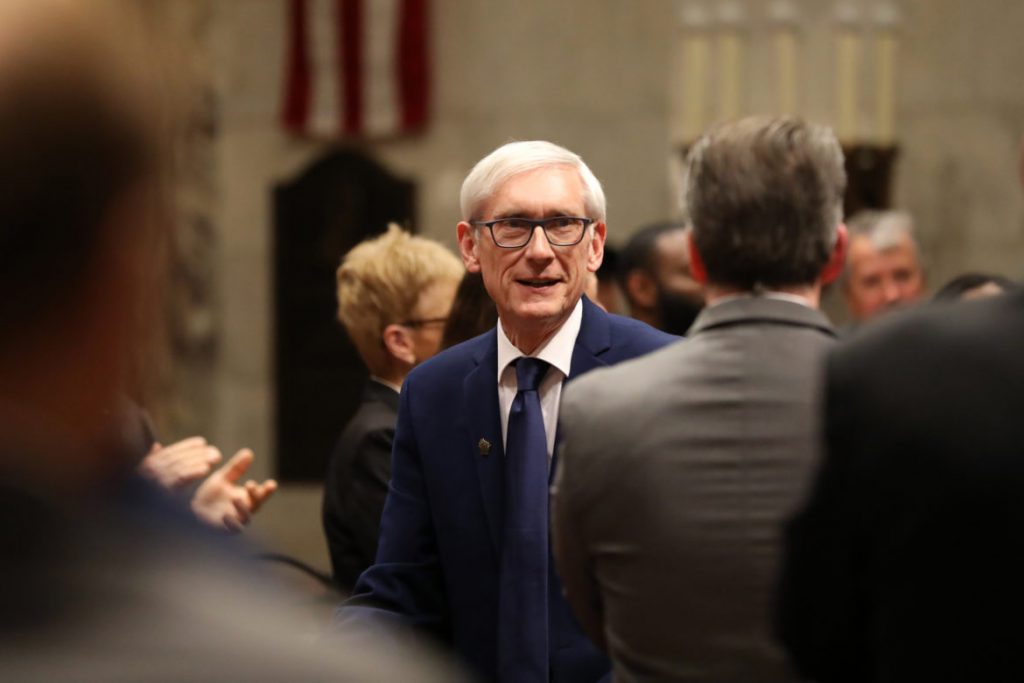Some ‘Tougher on Crime’ Bills Passed
Gov. Evers vetoed most, but signed a few.
The Wisconsin Legislature’s “tougher on crime” push ran into a partial roadblock, with Gov. Tony Evers vetoing four of bills that were part of the crime package as February drew to a close. These measures represented some of the more controversial aspects of the legislative package, covering parole revocations and juvenile incarceration.
Spearheaded by Rep. Joe Sanfelippo and other Wisconsin Republicans, the bills kindled a new debate in Wisconsin’s criminal justice system. A slew of offenses were covered by the nine initial bills, from imposing new mandatory minimums for retail theft to adding language affecting casing involving witness intimidation. As time went on, more bills were added focused on carjackings, including $5 million in grants for more personnel and equipment for police agencies.
Voices against the bills filled the Capitol as citizens organized to oppose the measures. Many of them were formerly incarcerated people, some of whom are still on probation or parole. At a time when there has been a lot of discussion in Wisconsin about reducing the prison population, critics described the bills as a giant step backwards.
“I object to this unfunded mandate on the Department of Corrections that moves Wisconsin in the wrong direction on criminal justice reform,” Evers wrote in his veto message. “This bill is estimated to have a fiscal impact of more than $200 million in just the first two years and hundreds of millions of dollars in unknown, ongoing costs to state taxpayers in the years to follow.” Sanfelippo has countered such criticisms by stating that Wisconsin shouldn’t put a price tag on public safety.
Evers also said, regarding Hutton’s bill, “investing in evidence-based programming that addresses barriers to reentry, enhances educational and vocational opportunities for returning citizens, and provides treatment for mental health and substance use issues has shown to be an effective way to reduce recidivism and save taxpayer money while improving public safety.”
Another bill introduced by Hutton limiting who is eligible for parole release was vetoed because Evers objected to “further restricting the Department of Corrections’ discretion to determine who is eligible for certain early release programs and who is a good candidate for early discharge from probation.”
There was also AB-806, a bill by Sanfelippo which expanded the list of offenses that could place a juvenile in Wisconsin’s Serious Juvenile Offender Program. Evers vetoed the bill, stating, “Science informs us that a punitive disposition system leads to worse outcomes. As I have said, what’s best for our kids is what’s best for our state, and it is vital that our efforts in reforming our criminal justice system recognize that our kids are worth much more than the worst decision they ever made.” Similar to Hutton’s parole bills, funding concerns also worked against the legislation.
It’s a potent point as the state grapples with the closure of Lincoln Hills and Copper Lake. The notorious compounds represent some of the largest juvenile detention facilities of their kind left in the country. A couple weeks before AB-806 was vetoed, members of the Joint Finance Committee sparred over funding the necessary replacement facilities to close Lincoln Hills and Copper Lake. Ultimately, the meeting ended with facilities set for the Milwaukee area not being funded. In the meantime Rep. Evan Goyke said, “Here we are kicking the can down the road another couple years. And that facility isn’t going to get any safer for the kids, or safer for the staff.”
These bills differed from the one signed by Evers in that rather than upping the penalty for witness intimidation, they affected the circumstances which would call for a video conference or deposition in place of a direct meeting between the victim and accuser in a legal setting. Rep. Shae Sortwell (R-Two Rivers) noted that “this standard of ‘risk of being intimidated, that seems really broad to me.” Sortwell was concerned that the language in the bill would impede a person’s constitutional right to face their accuser simply due to a risk of the witness being intimidated.
Another bill signed by Evers set a mandatory minimum of 18 months in prison for a person who has reached a fifth or sixth offenses for operating a vehicle while intoxicated. This would now be in addition to current laws stating that people on their fifth or sixth OWI would face a Class G felony, $25,000 fine, and up to ten years in prison.
Evers also signed a bill into law making it a crime to bring prohibited objects, otherwise known as contraband, into a jail or prison to deliver to an incarcerated person. This bill, like others introduced during January and February, was not part of the bill package but worked in a complimentary way to many of the bills. As the criminal justice debate continues in Wisconsin, residents will continue to witness these political battles over the future of one of America’s most incarcerated states.
Reprinted with permission of Wisconsin Examiner.






















